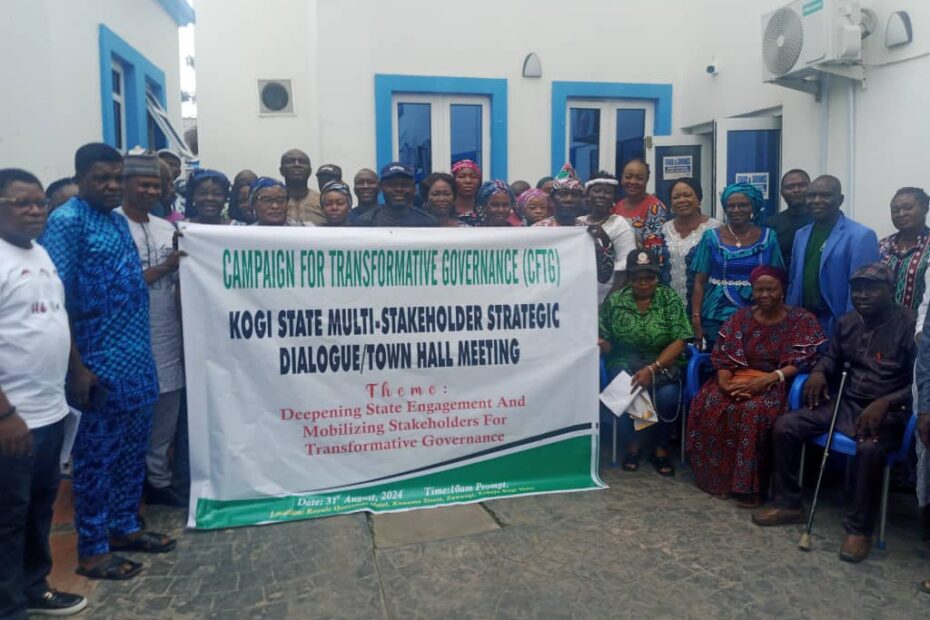By Stephen Adeleye
Lokoja, August 31, 2024
A civil society organisation, Campaign For Transformative Governance (CFTG), has called for effective engagement of citizens in driving transformative governance in Kogi State.
Mr Tijani Abdulkareem, the State Secretary of CFTG, made the call at a Multi-stakeholder strategic dialogue/town hall meeting with the theme, “Deepening State Engagement and Mobilizing Stakeholders for Transformative Governance” on Saturday in Lokoja.
Abdulkareem, who doubles as the Executive Director, Socio Economic Research and Development Centre (SERDEC), described CFTG as an initiative that aims to promote and advocate for transformative governance practices.
According to him, CFTG goal is to create a more just, equitable, and sustainable society by challenging existing power structures and promoting alternative governance models.
“The CFTG is a platform bringing together civil society and labour in active solidarity toward demanding good governance and exploring new ways of building and consolidating actions toward promoting and ensuring transformative governance that responds to the need and aspiration of the citizens.
“The Kogi CFLG is part of a National campaign group that mobilize stakeholders drawn from labour and civil society toward strengthening ties, building collective voices, identifying shared aspirations and area of interest and building solidarity toward a transformative governance in the country,” he said .
He noted that the CFTG is being implemented in Kogi under the state Charter of Partnership, Mobilisation and Engagement (CAPME) to improving transformative governance.
He stressed that CAPME confirmed CFTG’s commitment to effectively engage government and citizen in driving transformative governance.
“CAPME establishes the action, results and impact of working with key stakeholders, mobilizing citizens to hold government accountable for transformative governance and inclusive development.
“It would also help in advocating for policy reforms and institutional changes, supporting marginalized communities and social movements.
“It will enhance fostering transparency, accountability, and anti-corruption measures, and encouraging sustainable development and environmental stewardship,” he said.
He explained that the thematic areas for CAPME intervention included ensuring accessible social protection for workers and citizens to end poverty and hunger.
He added that it would also promote Participatory Governance through access to Public Finance Management Information, tackling Insecurity arising from illegal Mining Activities leading to Socio-environmental issues.
According to him, Kogi State over the years has had its own share of bad governance riddled with high rate of unemployment, unequal and unjust distribution of income and wealth.
“High level of insecurity, abject poverty, low level of social and political consciousness, increased illiteracy rate, poor health services, pitiable housing conditions, lack of amenities and government services, among others.
“Data from the National Bureau of Statistic (NBS 2022) shows that unemployment rate stands at 39 per cent with the National Multidimensional Poverty Index (MPI) putting the state poverty rate at 61 per cent, indicating that more than half of the population is now living in multidimensional poverty.
“The Under five mortality rate in Kogi stands at 148, higher than the national rate of 132, making Kogi the 9th State with the highest under-five mortality rate in the country.
“The CAPME Intervention is to draw attention to demand social justice for the people through holding government accountable to roll back this blurring data and indicators surrounding inadequate social protection policies, unaccountable public finance management and Socio-economic and environmental issues.
“The intervention will help to taking necessary action through inclusive, participatory and transformative governance toward ensuring a sustainable development,” Abdulkareem said.
In his remarks, the Chairman of Trade Union Congress (TUC), Kogi chapter, Comrade Ahmed Tijani, said the CAPME intervention would boost civil society and labiur unions’ collaboration to ensure good governance in the state.
Ahmed commended the organisers for the initiative , adding that it would promote participatory democracy and citizen engagement.
“TUC is committed in bringing governments, civil Society and the people together to ensure true transformative governance in our state
“There is so much hardship in the country and the workers are mostly directly affected. As at today, workers can not feed three square meals a day.
“So we look forward to see that Kogi Government implement the N70,000 new minimum wage approved by the Federal Government so that it will reduce the sufferings of the masses” Tijani said.
In his paper presentation, titled: “the Role of Civil Society and Labour in Driving Development”, Hamza Aliyu, opined that effective collaboration between civil society and labor unions would create a powerful synergy that advances development goals.
Aliyu, who is the Executive Director, Initiative for Grassroot Advancement, (INGRA), said CSOs could partner with unions to advocate for better labor standards or address issues like child labor.
“Both sectors often engage in grassroots mobilization, which can drive local and national change. Their efforts can help build a more informed and active citizenry, capable of driving development initiatives from the ground up.
“In recent years, the collaboration between civil society and labor unions has extended to various social justice issues, including gender equality, environmental protection, and anti-corruption.
“They have been involving in campaigns such as the #EndSARS movement, which addressed police brutality and called for systemic reforms,” Aliyu said.
Aliyu, therefore called for effective monitoring and evaluation impact, strengthening institutional capacity, promoting inclusivity and diversity, and building of alliances with other Stakeholders, among others.
End
